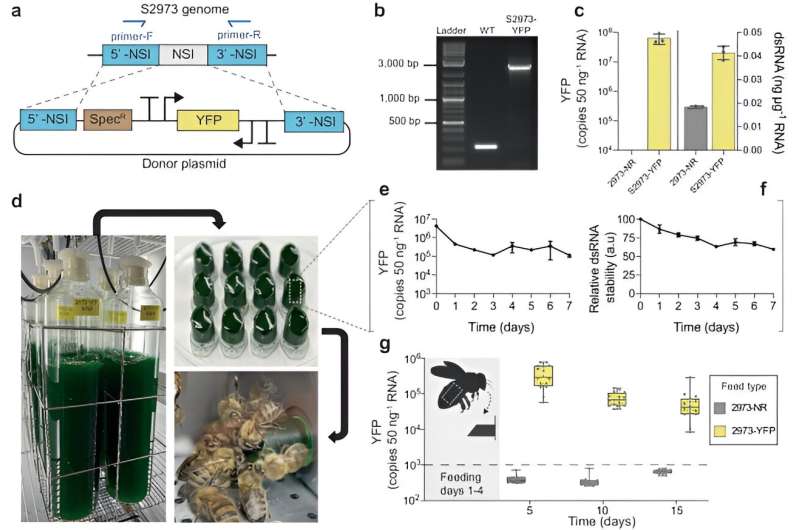Honey bees play a crucial role in global agriculture as pollinators, contributing to the growth of numerous crops essential for human consumption. However, the health of honey bee colonies is threatened by various factors, including viral infections such as deformed wing virus DWV. These infections, often transmitted by Varroa mites, can lead to deformities and fatalities in bees, posing significant challenges to beekeepers and agricultural sustainability. In a groundbreaking development, scientists at the United States Department of Agriculture’s Agricultural Research Service ARS have devised an innovative solution to combat viral infections in honey bees using an edible antiviral treatment derived from blue-green algae.
Addressing the Viral Threat: DWV and other viruses represent a significant threat to honey bee populations worldwide, contributing to the decline of millions of colonies annually. Traditional treatments for bee diseases and parasites do not effectively target viruses, leaving beekeepers with limited options to mitigate viral infections. The absence of effective antiviral treatments exacerbates colony losses, jeopardizing agricultural pollination services and food security. Recognizing the urgent need for novel interventions, researchers at ARS embarked on a mission to develop a sustainable and scalable solution to bolster honey bee health and combat viral infections.
The Promise of Engineered Algae: Drawing inspiration from nature, scientists turned to blue-green algae, also known as microalgae, as a potential source of antiviral compounds for honey bees. Microalgae offer a nutritional profile akin to pollen, making them an ideal candidate for incorporation into bee diets. Furthermore, microalgae are amenable to genetic engineering, allowing researchers to tailor their properties to target specific pathogens, including DWV. Engineered algae strains possess immune-boosting capabilities, enabling honey bees to mount a robust defense against viral infections. Moreover, the cultivation of microalgae for bee feed production aligns with sustainable practices, as these organisms contribute to carbon dioxide sequestration through photosynthesis.
A Sustainable Approach to Bee Health: The utilization of engineered algae represents a paradigm shift in beekeeping practices, offering a sustainable and scalable solution to combat viral infections in honey bees. By incorporating engineered algae into bee feed formulations, beekeepers can enhance colony health and resilience against viral pathogens. Unlike conventional treatments, which may require complex processing and administration methods, engineered algae can be seamlessly integrated into existing beekeeping practices without significant logistical challenges. Furthermore, the ecologically friendly nature of microalgae cultivation underscores its potential as a long-term strategy to support honey bee populations and promote agricultural sustainability.
Navigating Regulatory Challenges: While the development of engineered algae holds immense promise for bee health, regulatory considerations must be addressed to facilitate its widespread adoption. Researchers acknowledge the importance of ensuring the safety and efficacy of engineered algae-based treatments through rigorous testing and regulatory approval processes. Collaborative efforts between researchers, regulatory agencies, and industry stakeholders are essential to navigate the regulatory landscape and pave the way for the commercialization of these innovative interventions.
Future Directions and Implications: The research conducted by ARS represents a significant milestone in the quest to protect honey bees from viral infections. Moving forward, scientists aim to expand their repertoire of engineered algae-based treatments to target additional bee viruses and pathogens. By harnessing the power of biotechnology and sustainable agriculture, researchers envision a future where honey bees thrive in healthy and resilient colonies, safeguarding agricultural ecosystems and ensuring global food security.
In the face of mounting challenges posed by viral infections, the development of edible blue-green algae as an antiviral treatment for honey bees offers a ray of hope for beekeepers and agricultural stakeholders worldwide. By leveraging nature’s ingenuity and the latest advances in biotechnology, researchers have devised a sustainable and scalable solution to combat viral threats and enhance bee health. As efforts to commercialize engineered algae-based treatments progress, the potential benefits for honey bee populations and agricultural sustainability are immense. With continued innovation and collaboration, we can build a brighter future where honey bees flourish, supporting thriving ecosystems and a resilient food supply.
